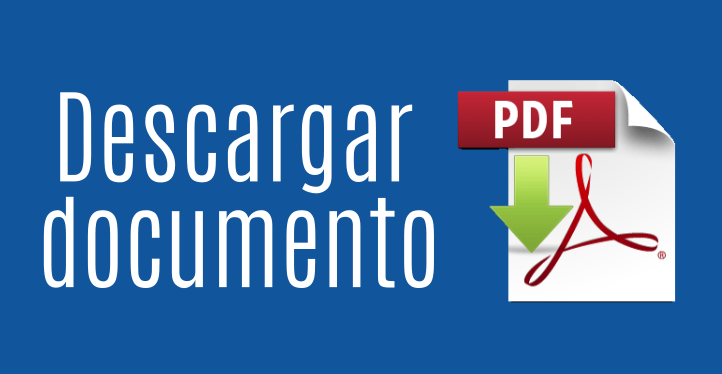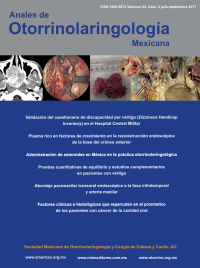An Orl Mex. 2017 jul;62(3):147-155.
Hernández-Rodríguez IY1, Gallardo-Ollervides FJ2, Quijada-Cruz MR1, Lozano-Cuenca J3, López-Canales JS4
1 Especialista en Medicina de Rehabilitación.
2 Especialista en Otorrinolaringología, Otología y Otoneurología.
Hospital Central Militar, Ciudad de México.
3 M en C en Farmacología.
4 Dr. en C en Farmacología.
Instituto Nacional de Perinatología, Ciudad de México.
Resumen
ANTECEDENTES: el vértigo es un trastorno vestibular con efecto negativo en las actividades de los pacientes. Es un problema especial debido a las dificultades en el diagnóstico y por ser un síntoma de difícil valoración. La rehabilitación vestibular es una alternativa efectiva para personas que padecen trastornos vestibulares y contar con un instrumento que evalúe la percepción de la discapacidad del paciente al ingreso de su tratamiento permitirá diseñar el tratamiento adecuado acorde con el grado de discapacidad que padece. El Dizziness Handicap Inventory (DHI) es una herramienta de origen estadounidense, útil para medir la discapacidad asociada con vértigo.
OBJETIVO: validar la escala DHI para pacientes mexicanos con vértigo del Hospital Central Militar.
MATERIAL Y MÉTODO: estudio observacional, analítico, prospectivo y longitudinal, efectuado de marzo a octubre de 2016 con pacientes referidos por el servicio de Otorrinolaringología para rehabilitación vestibular. Se realizó la traducción y adaptación cultural del DHI y se aplicó a los pacientes a su ingreso al servicio de Rehabilitación. Se valoró la consistencia interna (índice alfa de Cronbach) de manera global y en cada una de las dimensiones.
RESULTADOS: durante el periodo de estudio ingresaron 73 pacientes referidos por el servicio de Otorrinolaringología al servicio de Rehabilitación con síntomas de vértigo para inicio de terapia vestibular. Se obtuvo un alfa de Cronbach total de 0.92, para dominio funcional 0.83, para dominio emocional 0.81 y para dominio físico 0.80. No se observaron diferencias en los coeficientes del DHI con la versión original.
CONCLUSIÓN: la versión mexicana del DHI es una herramienta confiable y válida para evaluar el efecto de la discapacidad percibida en pacientes con vértigo del Hospital Central Militar.
PALABRAS CLAVE: vértigo, cuestionario de discapacidad por vértigo, Dizziness Handicap Inventory.
Validation of the Dizziness Handicap Inventory at Central Military Hospital, Mexico.
An Orl Mex. 2017 July;62(3):147-155.
Hernández-Rodríguez IY1, Gallardo-Ollervides FJ2, Quijada-Cruz MR1, Lozano-Cuenca J3, López-Canales JS4
1 Especialista en Medicina de Rehabilitación.
2 Especialista en Otorrinolaringología, Otología y Otoneurología.
Hospital Central Militar, Ciudad de México.
3 M en C en Farmacología.
4 Dr. en C en Farmacología.
Instituto Nacional de Perinatología, Ciudad de México.
Abstract
BACKGROUND: Vertigo represents a vestibular disorder with a negative impact on the activities of the patients and is a special problem due to the difficulties in diagnosis and because it is a symptom of difficult assessment. Vestibular rehabilitation is an effective alternative for people suffering from vestibular disorders and have an instrument that evaluate the perception of the patient’s disability upon admission of their treatment will allow the design of an appropriate therapy according to the degree of disability. The Dizziness Handicap Inventory (DHI) is a tool of American origin, useful for measuring the disability associated with vertigo.
OBJECTIVE: To perform the translation and validation of DHI in Central Military Hospital patients.
MATERIAL AND METHOD: An observational, analytical, prospective and longitudinal study was performed from March to October 2016 with patients referred by the Otorhinolaryngology department for vestibular rehabilitation. The translation and cultural adaptation of the DHI was carried out and it was applied to patients upon admission to the rehabilitation service. The internal consistency (Cronbach’s alpha index) was assessed globally and in each of the dimensions.
RESULTS: During the period study 73 patients were referred by the Otorhinolaryngology department to Rehabilitation service with symptoms of vertigo for beginning vestibular therapy, obtaining a total Cronbach’s alpha of 0.92, for functional domain 0.83, for emotional domain 0.81 and for physical domain 0.80. There were no differences in the DHI coefficients with the original version.
CONCLUSION: The Mexican version of the DHI is a reliable and valid tool to evaluate the impact of the perceived disability in patients with vertigo of the Central Military Hospital.
KEYWORDS: vertigo; Dizziness Handicap Inventory


